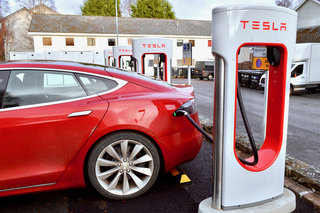Electric car charging stations are not free. However, many electric car owners find the charging stations to be worth the cost because they are much cheaper to operate than gas-powered cars. The cost of charging an electric car is typically about one-third the cost of fueling a gas-powered car.
Can I Charge My Electric Car For Free?

There are a few ways to charge an electric car for free. One way is to find a public charging station. Another way is to ask a friend or family member if you can charge your car at their house. Some businesses also offer free charging for electric car owners.
Electric vehicles are becoming increasingly popular among drivers due to their ability to drive green. Electric vehicles do not have to pay for gas when fully charged. Is it cheaper to buy an electric car than regular gasoline? You can estimate the cost of charging your car’s battery and how much power it consumes by knowing its capacity and how much power it consumes. You’ll notice a huge difference if you use your vehicle’s maximum charging rate and use an equal amount of energy at the same time. Off-peak electricity usage can result in a significant reduction in kilowatt-hour costs. If you are charging at a public charging station, you can pay for your session using your credit card.
To save money, look for discounts for at-home charging. In addition to PlugShare, there are other companies that provide maps of free charging stations throughout the United States. Electric car owners who use their vehicles at night may be able to take advantage of reduced electricity rates from some utilities. Most new electric vehicles require the purchase of a Level 1 charging cable. The cost of upgrading your Level 2 charger will be prohibitively expensive. It is a moral obligation to pay for the charging station unless it is available at your workplace or elsewhere for free.
Electric vehicles have a number of advantages in addition to lowering emissions, lowering running costs, and reducing reliance on foreign oil. Electric vehicles may be more expensive at first, but the cost of electricity they use can be lower than that of gasoline or diesel, making them more cost effective to drive. Electric vehicle costs will be determined by a number of factors. The costs of batteries, charging infrastructure, and fuel will all play a role in making the project a reality. The price of electricity is one of the most important factors to keep in mind.
How Much Does It Actually Cost To Charge An Electric Car?
Charging an electric vehicle at a commercial charger can cost anywhere from $10 to $30 on average, from nearly empty to nearly full. Electric vehicles, especially those traveling for extended periods of time, must be charged at a commercial charger, which is significantly more expensive than charging them at home.
Electric car owners in the United States use 38% of their home electricity for charging, increasing their electricity costs. According to the National Electric Vehicle Charging Infrastructure Chargemaster, as of November 2021, the national average price of electricity is 13.7 cents per kWh, and electric vehicles can travel four miles per hour. As of this writing, the average cost of kWh in California is 22.81 cents, according to the California Energy Commission. Level two EVSE systems can cost between $400 and $6,500 for equipment and between $600 and $12,700 for installation. Another way to generate energy for your car is to install solar panels on your home. A 10 kWh solar panel system will cost between $17,538 and $23,458.
Electricity costs an average of 1,069 pence per year in the United Kingdom, compared to £826 per year in the OECD. It could be explained by the fact that British households pay more for electricity than the OECD average. To save money on your electric bill, you should consider using home charging. Level 3 chargers are the quickest, can charge your battery almost instantly, and can almost cover the entire length of your battery. The cost of a single charge typically ranges between $10 and $30, making this an extremely cost-effective option. When you want to charge your car at home, a level 3 charger is the best option. The battery can be charged in just an hour and is typically priced between $10 and $30 per charge. This method not only keeps your car’s batteries fully charged but it can also be very time-effective.
Is It Free To Charge An Electric Car At Walmart?

Yes, it is free to charge an electric car at Walmart. In fact, Walmart offers one of the largest public electric vehicle (EV) charging station networks in the United States. With over 2,600 stations across the country, Walmart makes it easy for EV owners to charge their cars while shopping.
Walmart has been expanding its charging stations in a rapid pace in recent months. In most Walmart locations, there is a charge speed of 150 kilowatts and 350 kilowatts, with an expected 80% charging in 15-30 minutes. Depending on where you live, you can expect to pay by the minute or kilowatt-hour. A vehicle can travel from empty to 80% charge in 30 minutes or less by plugging in. The typical range for a rapid charging charge will range between 8 and 20 miles per minute. You should think about how much extra driving time you will get if your car takes 20 minutes longer to charge but you drive longer. Five states, including the District of Columbia, do not have Walmarts that provide chargers.
After a 10-minute grace period, a idle fee of $0.30 per minute is imposed by each state. Each state charges by the minute in one of the twenty-eight states that do so. America Pass is a good way to get America to pass. 25% of all orders are saved by joining for $4 per month.
The Average Cost Of Charging An Electric Ca
Electric cars are becoming increasingly popular, and the number of charging stations has also risen. If you’re using public charging stations, the average cost per kWh is between $0.30 and $0.70, with around 3 to 4 miles per kWh provided. If you have an electric car, you should keep an eye out for the prices at the charging station near you, as it may cost around $30 to fully charge it.
How Long Does It Cost To Charge An Electric Car?
When you consider the cost of an EV, you will need approximately 394 kWh over that time period. In June 2022 (the average household electricity bill in the United States), it would cost about $59 per month to charge an electric car using the household average.
According to the Energy Information Administration, an electric car’s charging fee per kilowatt-hour (kWh) is around 15 cents in the United States. If you drive about 1,183 miles per month, an EV will cost you around $59 per month for charging. Your utility provides discounts that should not be taken into account here. A 12-gallon gas tank will cost approximately $47 in fuel and $182 in monthly refueling fees. The cost of recharging a car that runs on both gas and electricity is less than the cost of refueling. The financial gap is reduced as a result of a more fuel-efficient vehicle, but it remains. Members of charging networks are frequently offered membership programs that allow them to reduce their recharge fees.
Tesla employs a dedicated network of 35,000 Superchargers around the world. Charging apps such as ChargePoint, Electrify America, and PlugShare are also popular. Charging faster increases the rate. Electric car owners learn quickly that public charging stations are free or charge for the use of the vehicle, according to Nick Voelcker. Electric cars are more affordable to fill up than gasoline-powered vehicles. You will have to pay to use the Tesla Supercharging stations, but they are not free.
It is time for electric cars to make their way into the mainstream. Because they are more efficient, less expensive to run, and better for the environment, they are preferable. With a range of 300 miles and a top speed of 60 miles per hour, they can be fully recharged in as little as 30 minutes. Electric cars can be charged at home or at a public charging station. It can take as little as 30 minutes to fully charge a car, but it may take as much as half a day. Your charging time will vary depending on the size of your battery and the speed of your charging point.
The Benefits Of Electric Vehicles
Electric vehicles have grown in popularity in recent years due to their numerous advantages over gasoline-powered vehicles. Electric car charging typically costs between $10 and $30 per charge, depending on the type of charger used. As a result, EV road trips are comparable to those of a standard (gas-powered) vehicle. Electric car owners are also increasingly able to charge their vehicles at home using Level 1 (120V) chargers, with Level 1 chargers being the most common method of charge. A Level 1 charger would normally take 40-50 hours for an electric car to fully charge, whereas a Level 2 charger would normally take 5-6 hours to fully charge a plug-in hybrid electric vehicle (PHEV). The cost of electricity is the most significant cost associated with electric vehicles, followed by the initial purchase price. Electric vehicles are typically less expensive to fuel and maintain than gasoline-powered vehicles, though they may be more expensive to purchase in some cases. Electric car owners can take advantage of discounts offered by some utilities. Electric vehicles are becoming increasingly popular and affordable, with a variety of advantages over traditional gasoline vehicles.

Who Pays For Electric Car Charging Stations
In the United States, the cost of electric car charging stations is typically borne by the owner of the property where the station is located. For example, a homeowner might install a charging station in their garage, and a business might install a station in their parking lot. The cost of the station itself is typically around $500, and the cost of installation is typically around $1,000.
When and how should commercial charging stations be installed on company property are becoming increasingly important issues for employers. While it is true that there are numerous EV charging station infrastructure costs to consider, you may not have to bear the entire tab. Incentives programs offered by the state and federal governments to cover infrastructure costs as well as the cost of charging stations. In the case of alternative fuels, the federal tax credit for EV charging station infrastructure can be up to $30,000. Some programs, such as AEP Ohio, provide 100% coverage. When you strategically place your station to reduce the length of conduit that must be installed, you will be able to save money on the installation. Your long-term profits will increase as your business grows.
Adding smart charging solutions and network managed charging stations to your property is an excellent way for your business to stay ahead of the competition. It is common for employers to provide charging as a free service to employees. If you want to find out how you can cover the cost of this worthwhile investment, contact EV Connect.
The Benefits Of Electric Vehicles
Electric vehicles are becoming more popular, and there are numerous reasons for this. The vehicles are both less harmful to the environment and more efficient than gasoline-powered vehicles, in addition to being faster and more fuel-efficient. Charging stations for electric vehicles are an excellent business model for small to midsized retailers because they attract customers, generate revenue, and increase the amount of time and money spent in the store. Electric vehicle drivers may be eligible for incentives from utility companies to help them save money on their electricity bills.